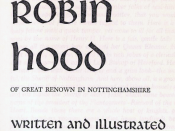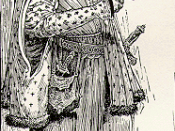" If Hero means sincere man, why may not everyone of us be a Hero?"
(Carlyle, qtd. in Hoyt' s New Cyclopedia of Practical Quotations). This statement
makes heroism seem simple, but is being sincere enough to make you a hero? In
modern society, the answer is likely to be yes, but in literature, it can be
controversial.
A hero in literature is generally portrayed as a man of action rather than
thought. He exceeds ordinary men in skill, strength, and courage and his usual
occupations are war and dangerous adventures. Surrounded by noble peers, he is
ruled by honor and pride and is ruthless towards his enemies. His responses are
generally predictable and his inability to decline a challenge can sometimes get him
into trouble.
The appearance of heroes in literature marks a revolution in thought that
occurred when writers and their audiences turned their attention away from
immortal gods to mortal men.("Hero",
Encyclopedia Britanica). Heroes were the
first human beings in literature and where able to spark a general interest in the
audience. They risked their lives for valiant causes and created a moment' s glory
that lived on longer after they were gone. Although this was a great change, these
heroes were still very much like the gods that preceded them and in turn created a
classic picture of heroism in all of our minds.
Nearly every literary work has a hero, or a main character that we think of as
being a hero. Modern literature has come a long way since the first hero and the
standards of heroism have been severely altered. Nowadays, literature potrayes a
hero as being : the classic hero who performs great feats of strength and is always
rewarded ; the humble hero who performs tasks simply because that is...



English
I really like this essay. And even double spaced. Good work
4 out of 4 people found this comment useful.